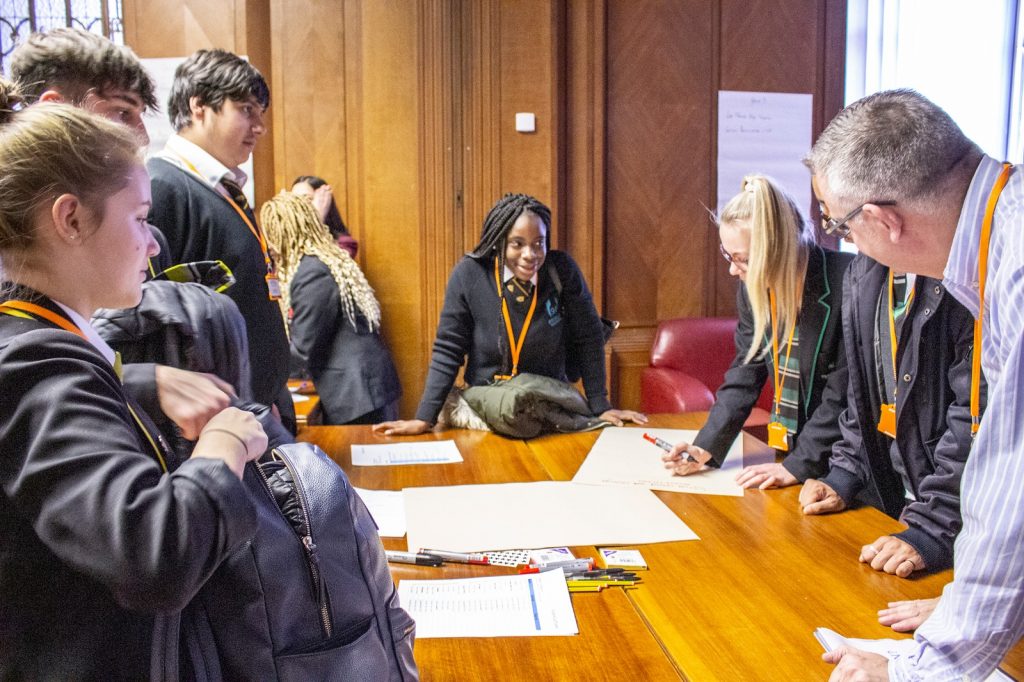Young Lutonians have been told by University of Bedfordshire boss Bill Rammell that they are “fundamental” to the success of their transforming town, as teenagers revealed how they feel forgotten, in an unsafe place that has little to offer them.
Helping to change this is part of the evolving focus on youth from #saveourtown after the historic decisions to grant planning permission for Power Court and Newlands Park, which will act as the catalyst for the further regeneration of the town.
The work has already begun in earnest with the inaugural Luton high schools’ Student Conference – an event organised by the campaign group and recognised by Luton Town Football Club Chief Executive Gary Sweet who, during a passionate speech to councillors on the night approval was granted for the M1 junction 10 site, said: “We all have a duty to create a new Luton for our future generations.”
The conference at Town Hall was aimed at engaging and empowering young people to make a difference in Luton and, representing more than 13,500 of their peers, 30 student ambassadors from Luton high schools – Ashcroft, Cardinal Newman, Chalk Hills, Challney Boys and Girls, Chiltern, Denbigh, Icknield, Lea Manor, Luton Penticostal Church Christian Academy, Putteridge, Stockwood Park and Stopsley – gave their views on what changes are important to them.
Most expressed concerns that there’s very little to do and that the town felt dangerous and unsafe, so they want safe spaces and youth clubs, plus better nightlife, music venues, an arena and a ‘decent cinema’.
They also highlighted that The Mall is old, tired, boring and has a poor range of shops, so they don’t shop there, instead preferring to go to Milton Keynes and London for the variety, big brands and designer shops.

Students in discussion at the conference
The delegates also heard inspirational talks from Luton Borough Council Leader Cllr Hazel Simmons MBE and Mr Rammell, Vice Chancellor and Chief Executive of the University of Bedfordshire.
“I truly believe that our town is at the cusp of an extremely exciting time of change,” he told the students in his keynote speech, adding: “When we talk about the importance of local people shaping plans for the town’s regeneration, this isn’t peripheral but fundamental to success.
“We need your help in ensuring that the town reflects its identity and diverse community. We need to ensure that significant investment in infrastructure gives you what you need to thrive, now and in the future. Above all, we need to shape this town with you and not around you.”

Students in discussion at the conference
Nigel Green, chairman of #saveourtown, said: “We’ve been campaigning for the physical changes that Luton has now been given planning permission for and this will help address the serious issues surrounding our town’s recent sad decline. But we also believe that must go hand-in-hand with transforming perceptions about way our town is portrayed. Too long has Luton been unfairly stigmatised, so now’s the time to usher in a new sense of positivity and pride.
“Young people are key to this because they stand to benefit most from the changes that will take place, so it is essential that we give the next generations a platform to share ideas about the future of their town. They’ve told Luton what needs to be done, so now the town needs to listen and find ways to turn these things into a reality. Everyone is part of helping to shape our future.

Students in discussion at the conference
“This is a legacy that doesn’t have to wait for shiny new facilities to be built, it can begin right now with small things. That could be anything from simply smiling at people to picking up litter, shopping locally at independent shops, supporting local clubs and businesses or getting involved with Luton projects. Just taking pride in being a Lutonian is the first small, but achievable, step towards changing people’s preconceptions.
“We would like to extend our warmest thanks to the town’s high school headteachers for helping to make this happen. Their support for the conference was fantastic and we hope this will be the first of many similar events planned for the future that can inspire young people to develop closer connections with their town and the wider community.”
